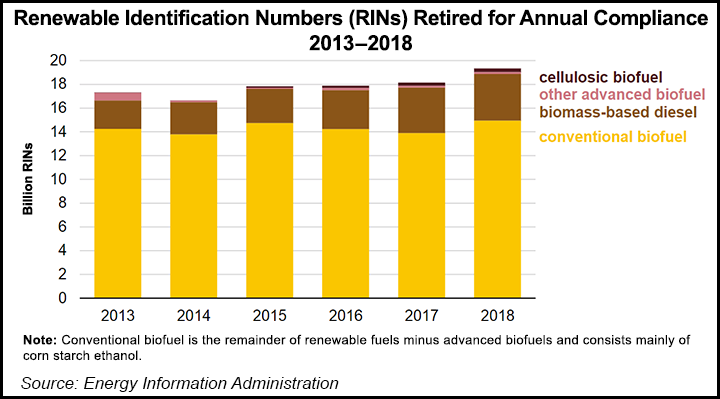Regulatory | Infrastructure | NGI All News Access | NGI The Weekly Gas Market Report
RNG Advocates Spurned as DC Circuit Upholds EPA Biofuel Refinery Waivers
The U.S. Court of Appeals for the District of Columbia Circuit on Tuesday upheld the federal government’s waivers for small refineries, which allows them to not include minimum renewables volumes in their transportation fuels to the chagrin of renewable natural gas (RNG) stakeholders.

A group of biofuel proponents had filed a lawsuit against the U.S. Environmental Protection Agency (EPA) accusing it of making it too easy for small refineries to receive economic hardship exemptions. RNG stakeholders at a hearing last month in Michigan had asked EPA to provide fewer small refinery exemptions (SRE) under the renewable fuel standard (RFS).
RNG in the transportation sector has grown more than 300% and has accounted for more than 95% of the cellulosic biofuel portion since 2014, according to the RNG Coalition’s David Cox, director of operations.
RNG advocates were not asking EPA to stop granting waivers when there were “disproportionate” economic hardships, Cox said. “We don’t have a problem with EPA doing that, but what happened in the last two years [is that] EPA has begun granting a lot more of them, and not accounting for that demand destruction” in RNG fuel*.
Cox said EPA’s supplemental proposal doesn’t mitigate the negative impacts future and existing waivers could do to the RNG market by taking it out of balance.
“The 2020 cellulosic biofuel volume set by EPA needs to also address the damage SREs have caused to date to the RNG market,” he said.
Texas-based Morrow Renewables President Luke Morrow said EPA officials now understand that granting “excessive SREs” could destroy the market. He wants EPA to consider “taking more drastic measures” to rebalance it.
Clean Energy Fuels Vice President Tyler Henn asked the federal agency to consider a cellulosic volume of up to 650 million gallons through 2020. “It is a level that is both attainable and mitigates the negative impacts of SRE.”
In other natural gas vehicle (NGV) developments, Landi Renzo Group’s U.S. subsidiary Landi Renzo USA has obtained EPA certification for model year 2020 Ford F-150 NGV pickup trucks outfitted with its compressed natural gas (CNG) fueling systems. The Torrance, CA-based alternative fuel equipment unit is using its “Eco Ready” CNG system on the NGV trucks.
Also earlier this month, assistant division chief of the California Air Resources Board (CARB), Sydney Vergis, told the Alternative Clean Transportation organization that state regulators are accelerating commercialization of zero and near-zero emission technology applications for on- and off-road vehicles under a $205 million program.
CARB’s pilot programs include electric vehicle technologies, as well as NGVs and the use of RNG, Vergis said.
The emphasis is on the less developed electric technologies for medium-duty and heavy-duty applications, such as the Hybrid and Zero-Emission Truck and Bus Voucher Incentive Project. However, low-nitrogen oxide NGV vehicles may compete for some of the funds.
*The Coalition for Renewable Natural Gas (RNG Coalition) clarified that it was not part of the appealed case.
© 2024 Natural Gas Intelligence. All rights reserved.
ISSN © 1532-1231 | ISSN © 2577-9877 | ISSN © 1532-1266 |
